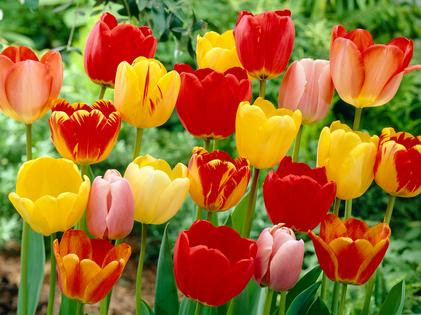
The Buzz About Neonics
Neonicotinoid-free bulbs
Finding pest controls that will protect our gardens but limit danger to ourselves and the environment is a constant process. Neonicotinoid insecticides, referred to in short as neonics, were introduced in the 1990’s as a safer option for humans and wildlife. Since then, this family of insecticides has become the most widely used in the world, and significant impacts on non-target invertebrates and the environment are becoming evident. Neonicotinoids include imidacloprid, thiacloprid, clothianidin, thiamethoxam, acetamiprid, nitenpyram, dinotefuran, nithiazine, and sulfloxaflor. If they are in a pesticide product, you can find them in the active ingredients list.

Concern over neonics stems from their pervasive qualities: high water solubility, long-lived nature (persistence in soil and plants), mobility through plant parts, and potential harm to non-target insects such as pollinators. In controlled toxicity studies, neonicotinoid insecticides act on the central nervous system of insects, causing excitation of the nerves, eventual paralysis and death. Lower levels of exposure to these insecticides in the field may not normally kill pollinator insects directly, but an increasing number of studies have shown negative impacts on individual and colony health over time, including impaired foraging, locomotion, and brood production, increased worker mortality and colony failure.
So how can you know if the plants you buy have had no neonicotinoid insecticide treatments and are safe for your landscape? Your only guarantee is to choose plants that have been certified as neonicotinoid-free. A.D.R. Bulbs’ Dutch growing operation, Ruigrok Flower Bulbs, has an A rating certification from the international sustainability expert MPS. All bulbs grown at the facility are neonicotinoid-free as are bulbs grown in many of their partner operations in the Netherlands. Neonicotinoid-free varieties will soon be clearly indicated in the listings on the A.D.R. website.
Ruigrok’s certification is a rigorous, ongoing process and is indicative not only of their commitment to eliminating neonicotinoid insecticides but also to a comprehensive program of best practices to better protect the environment. By tracking crop protection methods, waste production and fertilizer, energy and water use, companies can make their production process more sustainable and reduce environmental impacts. Ruigrok’s 2600 solar panels on their warehouses, for example, has enabled them to be entirely energy self-sufficient.
There is much support for bans on the use of neonicotinoid insecticides in the Netherlands. In 2018, the European Union banned the three main neonicotinoids (clothianidin, imidacloprid and thiamethoxam) for all outdoor use. Since then, some European countries have banned more of the insecticides in the neonicotinoid family. In the US, however, political battles continue regarding the suspension of the use of these insecticides. As of early 2020, the US Environmental Protection Agency intends to allow five neonicotinoid pesticides (acetamiprid, clothianidin, dinotefuran, imidacloprid, and thiamethoxam) to remain in the US marketplace, likely until more definitive studies of the harm to pollinators are produced to outweigh the economic impact of stopping their use. Until then, short of removing flowers for a couple of years and covering host plants for a season, consumers will need to rely on certification of neonicotinoid-free plants.
Latest Posts
Latest Posts
-
August 03, 2020Chris Ruigrok
-
June 05, 2020Patricia Vecchio
-
May 28, 2020Patricia Vecchio




